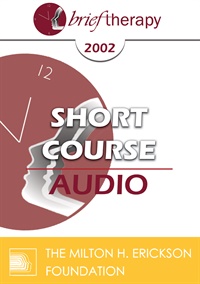
- Average Rating:
- Not yet rated
- Topic Areas:
- Short Courses | Couples Therapy | Brief Therapy
- Categories:
- Brief Therapy Conference | Brief Therapy Conference 2002
- Faculty:
- Marilia Baker, MSW
- Duration:
- 1:17:59
- Format:
- Audio Only
- Original Program Date:
- Dec 12, 2002
- Short Description:
- This session uses the Beauty and the Beast story as a living metaphor for long-term relationships and the emotional transformations couples move through over time. Drawing on myth, film, and clinical work, it explores power struggles, projection, sacrifice, dialogue, and the ways intimacy reshapes both partners. Therapists gain a creative, story-based lens for understanding couple dynamics, helping clients move past impasses without turning therapy into a battle of right and wrong.
- Price:
- $15.00 - Base Price

- Average Rating:
- Not yet rated
- Topic Areas:
- Short Courses | Adlerian Therapy | Brief Therapy | Therapist Development | Relationships
- Categories:
- Brief Therapy Conference | Brief Therapy Conference 2002
- Faculty:
- James Bitter, EdD | William Nicoll, PhD
- Duration:
- 1:19:43
- Format:
- Audio Only
- Original Program Date:
- Dec 12, 2002
- Short Description:
- Five areas that define Adlerian Brief Therapy (ABT) are addressed within a relationshipintervention focusing continuum. Depending on emphases along the continuum, the process of therapy can look quite different even within the Adlerian model. Two approaches to ABT are delineated and demonstrated in this session: one emphasizing relational qualities and integration of Adlerian teleology with awareness, contact and experience; the other organizing the session around strategies for change.
- Price:
- $15.00 - Base Price
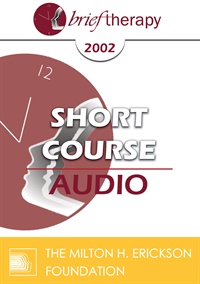
- Average Rating:
- Not yet rated
- Topic Areas:
- Short Courses | Brief Therapy | Family Therapy | Relationships | Strategic Therapy
- Categories:
- Brief Therapy Conference | Brief Therapy Conference 2002
- Faculty:
- Les Blondino, LPC, LMFT
- Duration:
- 1:17:05
- Format:
- Audio Only
- Original Program Date:
- Dec 12, 2002
- Short Description:
- Erickson recognized the vital importance of changing the client's relationships within their social contexts. Frequently, he included the client's family, friends and others to make therapy briefer with more permanent positive outcomes. Participants will learn ways to better understand the influence of social contexts, engage the social network and influence relationships to promote change. Case analogies will be given and videotape examples from actual session demonstrate the Strategic Family Therapy approach.
- Price:
- $15.00 - Base Price

- Average Rating:
- Not yet rated
- Topic Areas:
- Short Courses | Brief Therapy | Cognitive Behavior Therapy (CBT)
- Categories:
- Brief Therapy Conference | Brief Therapy Conference 2002
- Faculty:
- Norma Barretta, PhD | Phillip Barretta, MA, MFT
- Duration:
- 1:19:35
- Format:
- Audio Only
- Original Program Date:
- Dec 12, 2002
- Short Description:
- This short course explores a competency-based approach to brief therapy that targets behavior change through pattern interruption, physiology, and language. Participants learn how posture, movement, imagery, and lateral thinking can quickly shift emotional states, disrupt stuck loops, and open new choices without lengthy analysis of the past. The session offers practical strategies for separating intention from behavior, reframing problems as challenges, and helping clients move from reactivity to proactive self-direction in real-world clinical work.
- Price:
- $15.00 - Base Price
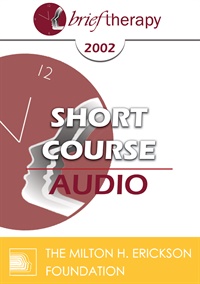
- Average Rating:
- Not yet rated
- Topic Areas:
- Short Courses | Grief | Trauma | Aging and Mortality
- Categories:
- Brief Therapy Conference | Brief Therapy Conference 2002
- Faculty:
- Naji Abi-Hashem, PhD
- Duration:
- 1:19:24
- Format:
- Audio Only
- Original Program Date:
- Dec 12, 2002
- Short Description:
- This short course offers a clear, compassionate framework for working with grief, trauma and the many losses that shape people’s lives. The presenter distinguishes normal and complicated grief, explores how trauma reactions overlap with mourning, and shows how culture, attachment and past experiences shape the healing process. Participants learn practical steps for assessment, emotional expression, meaning making and reintegration, helping clients move toward resolution with greater stability and resilience.
- Price:
- $15.00 - Base Price
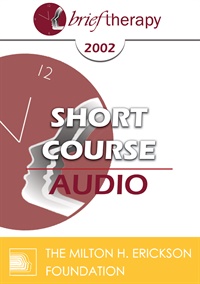
- Average Rating:
- Not yet rated
- Topic Areas:
- Short Courses | Group Therapy | Brief Therapy | Experiential Therapy | Family Therapy
- Categories:
- Brief Therapy Conference | Brief Therapy Conference 2002
- Faculty:
- Charles Bruder, PhD | Kimball DelaMare, LCSW | Jared Balmer, PhD | Rick Jackson, MD
- Duration:
- 1:01:43
- Format:
- Audio Only
- Original Program Date:
- Dec 12, 2002
- Short Description:
- This workshop will present a new model for delivering highly effective family therapy in a very brief time period utilizing multi-family group therapy workshops. A literature review as well as outcome research data will be presented along with audio-visual material to increase attendees' experiential understanding of the process.
- Price:
- $15.00 - Base Price
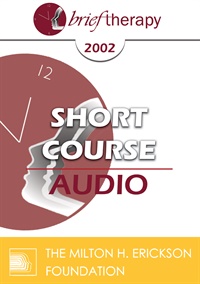
- Average Rating:
- Not yet rated
- Topic Areas:
- Short Courses | Abuse | Storytelling | Brief Therapy | Memory
- Categories:
- Brief Therapy Conference | Brief Therapy Conference 2002
- Faculty:
- Janice Gasker, DSW
- Duration:
- 1:19:27
- Format:
- Audio Only
- Original Program Date:
- Dec 12, 2002
- Short Description:
- Explore the empirical analysis of the life stories of Marilyn Monroe, Carl Jung, Virginia Woolf, DH Lawrence, Oprah Winfrey and others to identify components of healthy life narratives about sexual abuse. Hear intriguing life stories while learning new narrative techniques for helping adult victims of childhood sexual ·abuse to integrate traumatic memories into functional life stories.
- Price:
- $15.00 - Base Price
Tags: Abuse Storytelling Brief Therapy Memory
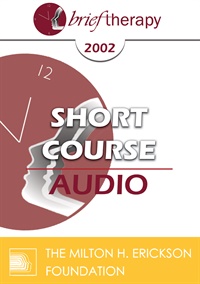
- Average Rating:
- Not yet rated
- Topic Areas:
- Short Courses | Brief Therapy | Ericksonian Hypnosis and Therapy Techniques | Solution Oriented Approach
- Categories:
- Brief Therapy Conference | Brief Therapy Conference 2002
- Faculty:
- Richard Landis, PhD
- Duration:
- 1:17:22
- Format:
- Audio Only
- Original Program Date:
- Dec 12, 2002
- Short Description:
- Erickson often saw the presenting symptom as the patient's solution to a problem that might not be immediately evident. By identifying the core problem that the patient was trying to solve with symptoms, Erickson was able to create appearingly simple solutions that produced lasting changes. This short course is the central element taken from our Congress presentation that teaches therapists how to view symptoms, in that Ericksonian mind set, to find brief but lasting solutions.
- Price:
- $15.00 - Base Price
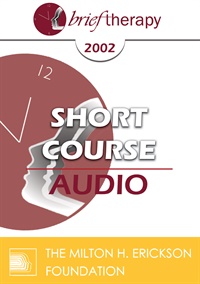
- Average Rating:
- Not yet rated
- Topic Areas:
- Short Courses | Addiction | Brief Therapy | Ericksonian Hypnosis and Therapy Techniques
- Categories:
- Brief Therapy Conference | Brief Therapy Conference 2002
- Faculty:
- Albina Tamalonis, PsyD
- Duration:
- 1:19:14
- Format:
- Audio Only
- Original Program Date:
- Dec 12, 2002
- Short Description:
- This course offers a practical step-by-step approach to overcoming vicious circles and addictions. The foundation of this comprehensive treatment is based on learning research and Ericksonian ideas. For example, what is learned can be unlearned and helping your patient target small changes eventually progresses into lasting change. An addiction effects all the areas of a patient's life; mental, emotional, physical, spiritual, behavioral and social. Six Ericksonian hypnotic protocols are given to help you help your patient create changes in these six areas.
- Price:
- $15.00 - Base Price
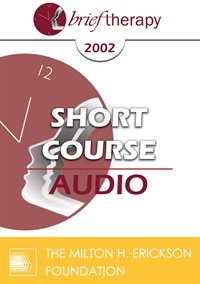
- Average Rating:
- Not yet rated
- Topic Areas:
- Short Courses | Children and Adolescent Therapy | Ericksonian Hypnosis and Therapy Techniques | Brief Therapy
- Categories:
- Brief Therapy Conference | Brief Therapy Conference 2002
- Faculty:
- Maria Escalante de Smith, MA
- Duration:
- 1:10:56
- Format:
- Audio Only
- Original Program Date:
- Dec 12, 2002
- Short Description:
- Adolescents go through very deep changes, and go through them more rapidly than their parents did. Many adolescents find that they cannot elaborate these changes. Finding a "safe place" where teens can talk about these processes in group therapy normalizes their feelings; eases tension and may help them regain their inner resources by using Ericksonian hypnosis. The oppositional defiant teenager may find ways to be helped solving their most common problems easily.
- Price:
- $15.00 - Base Price
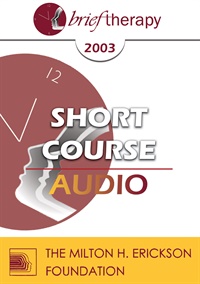
- Average Rating:
- Not yet rated
- Topic Areas:
- Short Courses | Addiction | Brief Therapy | Psychotherapy | Abuse | Motivation | Personality Disorders
- Categories:
- Brief Therapy Conference | Brief Therapy Conference 2003
- Faculty:
- Ralph Armstrong, MD
- Duration:
- 1:37:13
- Format:
- Audio Only
- Original Program Date:
- Dec 13, 2003
- Short Description:
- Motivation is crucial to successful recovery from Substance Use Disorders. Fifteen DSM IV conditions reduce the motivation needed to bond with programs that assist in abstinence. Child abuse and neglect are frequent in substance abusers, and a conceptualization of its role in substance abuse is given. Therapy for sequelae such as schizoid personality, resentment, pessimism and others are described. with treatment of Axis I and II disorders accomplished, and the effects of abuse/neglect allayed, involvement with 12 step programs is more likely.
- Price:
- $15.00 - Base Price
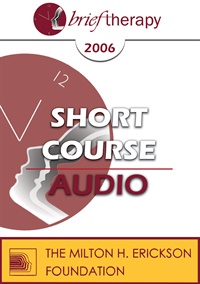
- Average Rating:
- Not yet rated
- Topic Areas:
- Short Courses | Brief Therapy | Goals of the Therapist | Therapist Development
- Categories:
- Brief Therapy Conference | Brief Therapy Conference 2006
- Faculty:
- Christine Guilloux, DESS Psychology
- Duration:
- 57:14
- Format:
- Audio Only
- Original Program Date:
- Dec 07, 2006
- Short Description:
- Subject, patient, client, supervisor, supervised, therapist, all of us are shaped from an essence, the stuff we are made of, the hero within. After drawing up an inventory and statement of the basic heroes that we have integrated and the stories that are the ones of our deep metaphors, we will travel and explore those resources that have contributed to our construction and our structure in productive and counterproductive ways. This workshop will offer ways to uti- lize them in our therapeutic goals for inner change.
- Price:
- $15.00 - Base Price
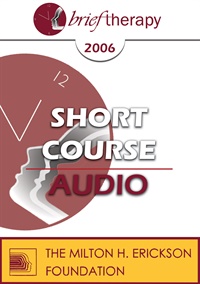
- Average Rating:
- Not yet rated
- Topic Areas:
- Short Courses | Brief Therapy | Solution Oriented Approach | Goals of the Therapist
- Categories:
- Brief Therapy Conference | Brief Therapy Conference 2006
- Faculty:
- Michael Reiter, PhD
- Duration:
- 1:19:30
- Format:
- Audio Only
- Original Program Date:
- Dec 07, 2006
- Short Description:
- This workshop will present how Solution-Focused Brief Therapists (SFBT) utilize expectation to help move clients toward goals. Workshop participants will be given the skills to understand how the basic principles, questions and interventions in SFBT all utilize expectation as a primary change agent. Further, participants will be shown ways to develop Solution-Focused Formula Tasks to incorporate expectation for positive client movement.
- Price:
- $15.00 - Base Price
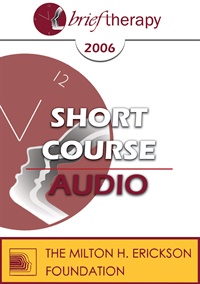
- Average Rating:
- Not yet rated
- Topic Areas:
- Short Courses | Addiction | Brief Therapy | Communication | Mind-Body | Utilization
- Categories:
- Brief Therapy Conference | Brief Therapy Conference 2006
- Faculty:
- Bart Walsh, MSW
- Duration:
- 1:19:30
- Format:
- Audio Only
- Original Program Date:
- Dec 07, 2006
- Short Description:
- This presentation poses a brief substance abuse treatment which acknowledges and accommodates the personal needs being addressed by substance use, bypasses perceived resistance and employs the essence of idiosyncratic psychobiological learning to achieve a body-mind gestalt complementary to the client's sobriety. Client self-empowerment and relapse prevention are built into the intervention. This method develops a safe framework for addressing any subsequent mental health themes directly or indirectly related to substance misuse. A particular form of body language known as ideomotor signaling is established in this procedure.
- Price:
- $15.00 - Base Price
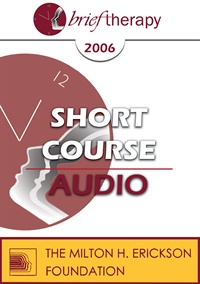
- Average Rating:
- Not yet rated
- Topic Areas:
- Short Courses | Brief Therapy | Meditation, Spirituality and Yoga | Multicultural | Psychotherapy
- Categories:
- Brief Therapy Conference | Brief Therapy Conference 2006
- Faculty:
- Lilian Borges, MA, LPC
- Duration:
- 1:18:38
- Format:
- Audio Only
- Original Program Date:
- Dec 07, 2006
- Short Description:
- In a world that is becoming more and more global and diverse, the need for a multicultural understanding of human experience is vital, especially for health care providers. Spirituality and religion are important elements of the culture. Spirituality and religion play a very important role in shaping how people are, the way they deal with birth and death, marriage and family, etc., and what is disease and how to cure it.
- Price:
- $15.00 - Base Price
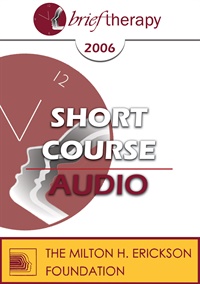
- Average Rating:
- Not yet rated
- Topic Areas:
- Short Courses | Brief Therapy | Hypnosis | Therapist Development
- Categories:
- Brief Therapy Conference | Brief Therapy Conference 2006
- Faculty:
- Rubin Battino, MS
- Duration:
- 1:19:30
- Format:
- Audio Only
- Original Program Date:
- Dec 07, 2006
- Short Description:
- Battino looks at how expectation shapes change in very brief therapy, often within a single session. Participants learn how reframing, metaphor, paradox, and simple experiential tasks can interrupt stuck patterns without extensive history-taking or diagnosis. Drawing from Ericksonian, solution-focused, and hypnotic traditions, the session offers practical, learnable strategies that show how therapist belief, language, and timing can dramatically influence outcomes.
- Price:
- $15.00 - Base Price
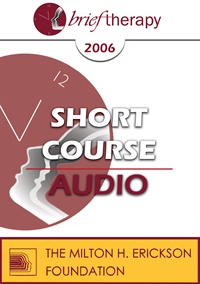
- Average Rating:
- Not yet rated
- Topic Areas:
- Short Courses | Brief Therapy | Therapist Development | Treatment Planning
- Categories:
- Brief Therapy Conference | Brief Therapy Conference 2006
- Faculty:
- Jennifer Weniger, PhD
- Duration:
- 1:09:42
- Format:
- Audio Only
- Original Program Date:
- Dec 07, 2006
- Short Description:
- The process of teaching the patient life skills is the most critical component of therapy. Effective therapists teach patients skills in order to successfully navigate through life. Everything that a therapist does is "education" in some form, and patients need practical skills in order their quality of life.
- Price:
- $15.00 - Base Price
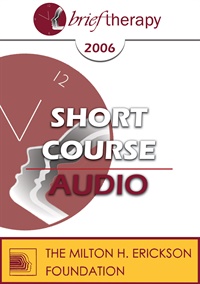
- Average Rating:
- Not yet rated
- Topic Areas:
- Short Courses | Affect | Attachment | Couples Therapy | Neuroscience
- Categories:
- Brief Therapy Conference | Brief Therapy Conference 2006
- Faculty:
- Marion Solomon, PhD
- Duration:
- 1:18:43
- Format:
- Audio Only
- Original Program Date:
- Dec 07, 2006
- Short Description:
- Participants in this workshop will explore ways to apply the understanding of attachment, trauma, brain and mind in diagnosing and treating relationship problems. A goal of the treatment is to accelerate the access to emotions in the more withdrawn partner, leading to more open communication between partners. Lecture, discussion and videotape demonstration will clarify how traumas of early disturbed bonding experiences can be seen and treated in a conjoint session.
- Price:
- $15.00 - Base Price
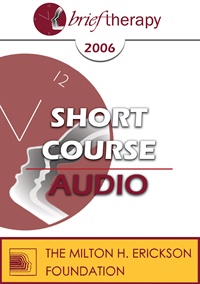
- Average Rating:
- Not yet rated
- Topic Areas:
- Short Courses | Borderline | Brief Therapy | Mind-Body | Neuroscience | Couples Therapy | Narcissism
- Categories:
- Brief Therapy Conference | Brief Therapy Conference 2006
- Faculty:
- Bruce Gregory, PhD
- Duration:
- 1:19:30
- Format:
- Audio Only
- Original Program Date:
- Dec 07, 2006
- Short Description:
- Dealing with narcissistic and borderline defenses that block healthy relating can be quite challenging when dealing with couples. This short course will address ways to creatively apply core aspects of Rossi's mind-body approach to develop treatment plans and interventions that can facilitate the containment of these defenses and help reorganize the dynamics of the couple system. The integration of the psychodynamic system and cognitive behavioral perspectives will be addresses throughout the course.
- Price:
- $15.00 - Base Price
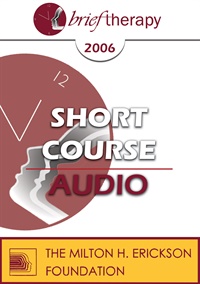
- Average Rating:
- Not yet rated
- Topic Areas:
- Short Courses | Reframing | Reality Therapy | Communication | Brief Therapy
- Categories:
- Brief Therapy Conference | Brief Therapy Conference 2006
- Faculty:
- Robert Wubbolding, EdD
- Duration:
- 1:19:30
- Format:
- Audio Only
- Original Program Date:
- Dec 07, 2006
- Short Description:
- The daunting task of leading clients from a disempowering sense of external control to an actualizing sense of inner control becomes doable by helping them reframe their behavior from actions to language, i.e., seeing actions as an attempt to send a message or a signal to the world around them. This practical idea will be illustrated in role-play demonstrations of the WDEP system: Wants, Doing (or behavior as language), self-Evaluation, and action Planning.
- Price:
- $15.00 - Base Price
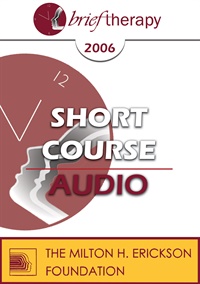
- Average Rating:
- Not yet rated
- Topic Areas:
- Short Courses | Pain and Healing | Brief Therapy
- Categories:
- Brief Therapy Conference | Brief Therapy Conference 2006
- Faculty:
- Jeanne Hernandez
- Duration:
- 1:19:30
- Format:
- Audio Only
- Original Program Date:
- Dec 07, 2006
- Short Description:
- This workshop will demonstrate how to guide patients in having intra-body conversations. Recognizing the essential purpose of pain as an attention-getting signal, we can sponsor pain patients' compassionate listening to their pain signals as opposed to trying to avoid them, and guide them to respond in ways that are self supportive and soothing. The process also allays anxiety and generalizes to effect management.
- Price:
- $15.00 - Base Price
Tags: Brief Therapy Pain & Healing
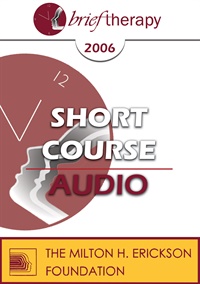
- Average Rating:
- Not yet rated
- Topic Areas:
- Short Courses | Multicultural | Brief Therapy | Family Therapy
- Categories:
- Brief Therapy Conference | Brief Therapy Conference 2006
- Faculty:
- Debra Ann Nixon, PhD
- Duration:
- 1:09:14
- Format:
- Audio Only
- Original Program Date:
- Dec 07, 2006
- Short Description:
- "Physician heal thyself" aptly describes this presentation for graduate supervisors/instructors who understand the need for increased diversity-mindedness amongst therapists. This presentation will focus on using proven pedagogical and therapeutic skills that will challenge graduate supervisors and instructors 1) to be self-relexive and diversity-minded and 2) to use themselves as the primary conduits of a new multicultural consciousness in teaching and supervision arenas.
- Price:
- $15.00 - Base Price
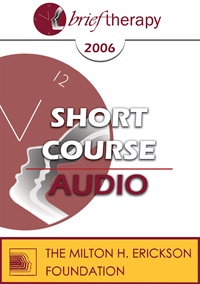
- Average Rating:
- Not yet rated
- Topic Areas:
- Short Courses | Brief Therapy | Psychotherapy | Cognitive Behavior Therapy (CBT) | Voice Therapy
- Categories:
- Brief Therapy Conference | Brief Therapy Conference 2006
- Faculty:
- Lisa Firestone, PhD | Joyce Catlett, MA
- Duration:
- 1:19:30
- Format:
- Audio Only
- Original Program Date:
- Dec 07, 2006
- Short Description:
- This workshop provides mental health professionals with an introduction of Voice Therapy, an innovative cognitive/affective/behavioral technique that facilitates change in psychotherapy. Through lecture, discussion and video tapes, participants will learn how to use voice therapy techniques and exercises to help patients overcome destructive thoughts and behavior in order to make meaningful changes in their lives.
- Price:
- $15.00 - Base Price
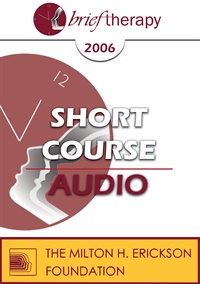
- Average Rating:
- Not yet rated
- Topic Areas:
- Short Courses | Brief Therapy | Depression
- Categories:
- Brief Therapy Conference | Brief Therapy Conference 2006
- Faculty:
- Richard Landis, PhD | Gary Ruelas, DO, PhD
- Duration:
- 1:19:30
- Format:
- Audio Only
- Original Program Date:
- Dec 07, 2006
- Short Description:
- In 1990, the presenters Heinz Von Forester, Gianfranco Cecchin, and Humberto Maturana created the Systemic Constructions human interaction model. This model has evolved into six overlapping domains that affect the social, spiritual and biological influences of human functioning and interactions. This course will teach how to use these six domains to help to ask the right questions that can lead to the break-up of clinical log-jams and increase the lasting effectiveness of the briefer therapies.
- Price:
- $15.00 - Base Price
Tags: Brief Therapy Depression
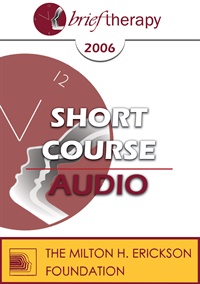
- Average Rating:
- Not yet rated
- Topic Areas:
- Short Courses | Brief Therapy | Solution Oriented Approach | Strategic Therapy | Anxiety | Future Oriented
- Categories:
- Brief Therapy Conference | Brief Therapy Conference 2006
- Faculty:
- Joseph Dowling, MS, LPC
- Duration:
- 1:19:30
- Format:
- Audio Only
- Original Program Date:
- Dec 07, 2006
- Short Description:
- This short course will describe a brief strategic/solution-focused and hypnotic approach to anxiety related disorders. Participants will learn to creatively engage their obsessive thinking, perfectionist, Whying and What Ifing clients via live demonstration, experiential exercise and case studies. The art of What Willing will be introduced conversationally, experientially and energetically. This course will demonstrate how a client can be transported back and forth in time and space, accessing her unique history of success and future memories of her best self.
- Price:
- $15.00 - Base Price

